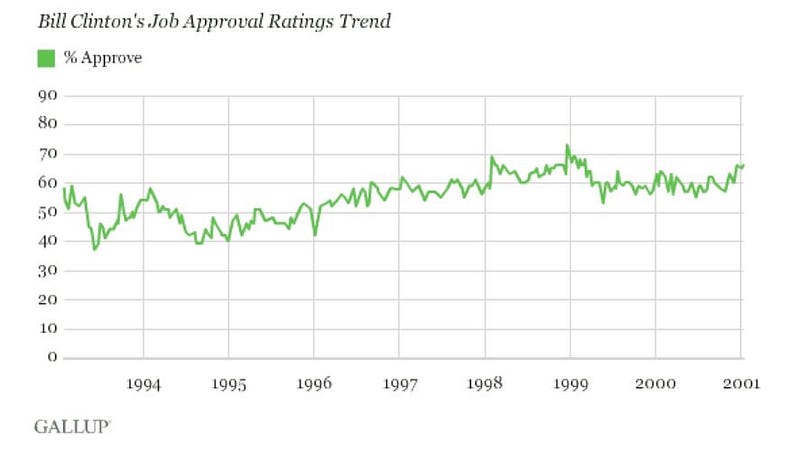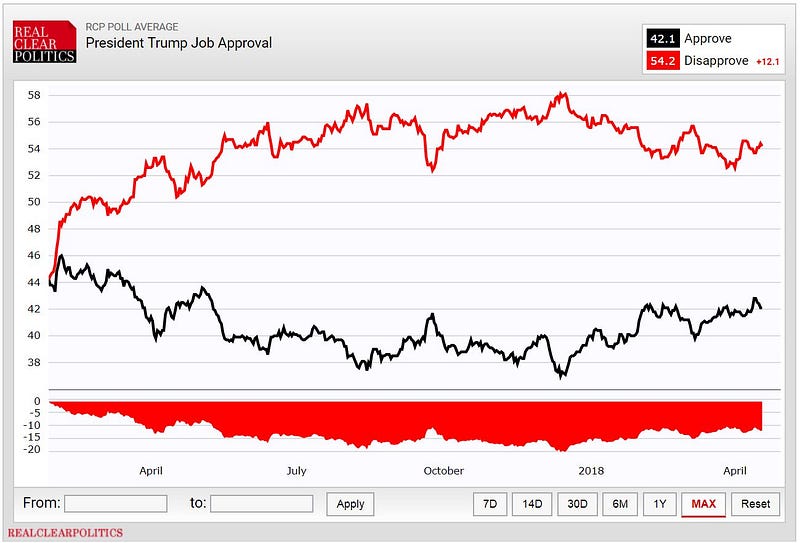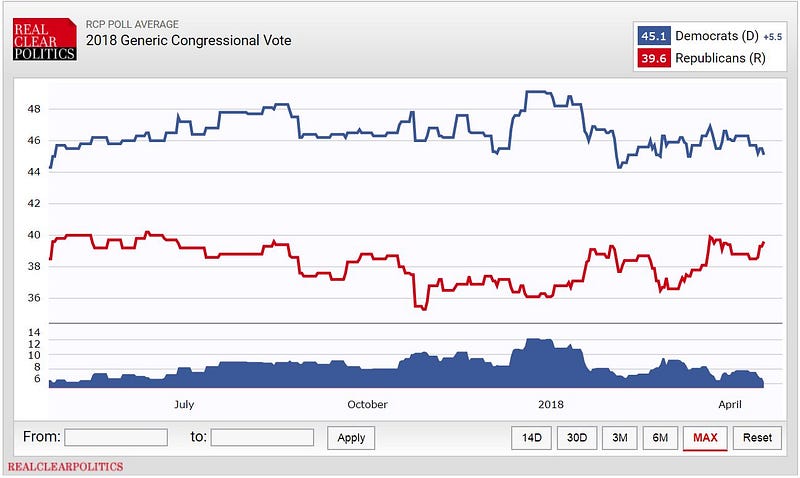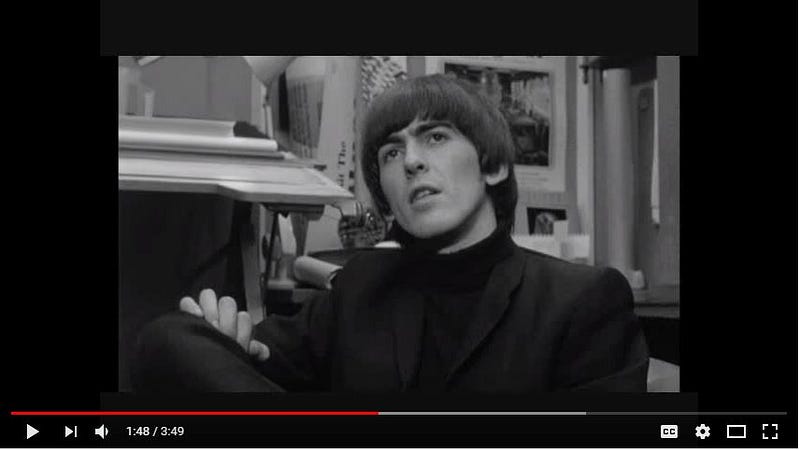By Kent R. Kroeger (Source: NuQum.com, April 20, 2018)
{Send comments to: kkroeger@nuqum.com}
The chances are still good that the Democrats will win control of at least the U.S. House this November.
The prediction market PredictIt.com gives the Democrats a 69 percent chance of gaining control of the U.S. House. And while the same market gives the Democrats only a 38 percent chance of controlling the U.S. Senate, those are odds the Democrats only a year ago would have made them giddy with optimism.
My own midterm election models (which you can access here) indicate, under current conditions, the Republicans will lose 37 House seats and 4 Senate seats, putting both chambers under the control of the Democrats.
The smart money remains solidly in the Democratic Party’s corner for the 2018 midterms.
Yet, with the 2016 presidential election as a vivid reminder, Democrats know there is no such thing as a ‘sure thing’ in American politics. Despite a year and a half media obsession over the Trump-Russia collusion investigation, on November 7th, the Democrats could still find themselves in the minority in both congressional chambers.
Here is why that is still a real possibility…
The Mueller investigation may not end with a definitive conclusion
For 18 months the Trump-Russia collusion story has dominated the national news media. According to the Tyndall Report, among the Top 20 news stories of 2017, Russia-related stories accounted for 31 percent of the coverage by the three broadcast news networks. The ratio for the cable news networks undoubtedly would be even higher.
Yet, after all this hostile coverage of the Trump presidency, Democrats need to prepare themselves for this real possibility: The Robert Mueller-led investigation probably will not indict Donald Trump.
“Mueller will not indict Trump for obstruction of justice or for any other crime. Period. Full stop. End of story. Speculations to the contrary are just fantasy,” wrote Paul Rosenzweig in The Atlantic last January. “Mueller will not indict the president, even for money laundering. The resolution of the current American crisis is going to be political, not criminal. The future lies with Congress and, ultimately, the electorate, not with prosecutors and the courts.”
Rosenzweig isn’t coming out of nowhere with that conclusion. Twenty years ago he served as a Senior Counsel in the investigation of President Clinton. What is his rationale? “The Department of Justice has a long-standing legal opinion that sitting presidents may not be indicted,” writes Rosenzweig. “First issued in 1973 during the Nixon era, the policy was reaffirmed in 2000, during the Clinton era.”
And what can we expect from the Mueller probe with respect to President Trump? According to Rosenzweig, he will file a report on his findings with the deputy attorney general, Rod Rosenstein (since the Attorney General Jeff Sessions has recused himself).
We are going to get a report. And based on what has been revealed so far, the chances of the Mueller probe proving Trump (or anyone in his orbit) colluded with the Russians to impact the 2016 election is less than certain.
Such an ambiguous outcome might further energize #TheResistance’s resolve to put the Democrats in charge of Congress. But it also has the potential to torpedo the movement’s organizing assumption that Trump is not just a misogynistic buffoon, but a traitor. The reality that Trump is not a Russian tool will be deflating for many of his critics.
Americans may come to the defense of an embattled president
Democrats should be concerned about another potential outcome of the Mueller probe. The American public may not just grow weary of the Trump-Russia collusion story, a significant percentage may rally around the president, particularly if the economy remains strong and real progress towards peace is achieved on the Korean peninsula.
There is an historical precedent for this phenomenon. Kenneth Starr’s probe into an array of controversies surrounding President Bill Clinton, including his relationship with Monica Lewinsky, resulted in the House impeaching the president on Dec. 19, 1998. Interestingly, as evidenced in the graph below, Clinton’s Gallup job approval ratings rose consistently until the House impeachment. And though his ratings did dip during the Senate trial (in which Clinton was not convicted), they never dropped below 50 percent.

Of course, how Americans react to Trump’s impending impeachment (assuming the Democrats take the House back) may be very different from the Clinton experience.
According to the April 2018 Quinnipiac poll, 52 percent of Americans believe Robert Mueller is conducting a “fair” investigation. While still a majority, this is the lowest level of support the Mueller probe has received from the American public.

Is this evidence of “Mueller probe fatigue”? Perhaps. At a minimum, the Democrats would be well advised to track the public’s mood with respect to the Mueller probe, particularly among independents and Democratic-leaning voters. Should either segment show growing signs of ‘Mueller fatigue,’ the Democrats will have a problem in November.
The economy shows no signs of slowing down
The economy is not working in the Democrats’ favor either. It shows no signs of slowing down, even with trade wars lurking about. Whether the credit belongs chiefly with Barack Obama or with Trump is anyone’s guess. What does matter is to whom the American people give the credit and the most recent evidence, from an April 2018 Quinnipiac University poll, is that a plurality of Democrats (!) now believe Trump — not Barack Obama — is responsible for the current strength of the country’s economy. As of April 9, 46 percent of Democrats agreed that Trump is more responsible for the United States economy’s current strength is due to Trump.
According to the New York Fed’s yield curve model, there is an 11 percent probability of a recession in the United States in the next twelve months (please check out this model’s accuracy here).
The Democrats are not likely to get any help from a souring economy when election day rolls around and they will face an opposition party that will try to make the election all about the economy.
If I were a betting man (and I am), I would say the economy is not going to help the Democrats in November, not that they need it to since midterm election results are not a simple function of the economy. Nonetheless, the Democrats’ chances of taking back Congress would be better if the economy wasn’t humming along as it is.
A formal peace on the Korean peninsula will prove deadly to the Democrats
The impending meeting of Trump and Kim Jong Un is the ultimate wild card before the midterm elections. It is easy to make glorious predictions (positive or negative) about any tangible outcomes coming from this meeting, but there is simply no way to know.
History suggests the chances are near zero that concrete steps towards a real peace agreement will arise from this first meeting. Nonetheless, just the novelty of it and the positive coverage likely to surround it works in the Republicans’ favor. Short of a physical brawl breaking out between Trump and Kim Jong Un, it very probable that Trump’s image will benefit substantially. And, frankly, a fist-fight might lift his image as well with a lot of Americans.
The Blue Wave may crest too soon
It is also possible that the “Blue Wave” may crest too soon. There is only so much energy that can be sustained by a political movement. Even true believers can get to a point where they just want to say “screw this, lets go see a movie.”
There are already “tentative” signs that Trump’s worst days in terms of job approval ratings may be over. Trump’s job approval ratings have been slowly but steadily rising for the past four months. This is the longest sustained increase (+3%) in his numbers for his young presidency. Of course, it would take just one ill-considered tweet for him to lose all of this improvement.

In addition, the generic ballot polling questions regarding the midterm elections are starting to show a small rebound for the Republicans. While the party gap in the poll averages are still over 5 percentage points (in the Democrats favor), it is a big improvement over just five months ago when the gap was near 12 percentage points.

These recent trends are small and far from conclusive. But, if I am a Democrat, I’m obsessing about those ‘small turns in the numbers.’ They may be an ‘early clue to the new direction.’
One of my favorite movie scenes comes from The Beatle’s first film, A Hard Day’s Night, wonderfully summarizes the political punditry class’s unending quest to predict future trends.

In the scene, George Harrison accidentally stumbles into an advertising executive’s office and finds himself recruited to be in an ad campaign featuring a young model named Susan.
Near the end of the scene, after Harrison is run out of the office for mocking ‘this Susan,’ the ad executive turns to his secretary and asks: “You don’t think he’s the new phenomenon, do you?”
“You mean an early clue to the new direction?” she replies.
“Where’s the calendar?” he says as he points to the calendar. “Its’s alright. He’s just a troublemaker. The change isn’t due for three weeks yet. All the same. Make a note not to extend Susan’s contract. Lets not take any unnecessary chances.”
That’s a pretty fair depiction of political polling and marketing as well. Seek the early clues. The new directions. Nate Silver, Kellyanne Conway and Frank Luntz are millionaires for a reason.
The smart money still remains solidly in the Democrats’ corner for the midterms. A lot must change in the environment for the Republicans to have any chance of keeping the House. Even as some national poll numbers improve, on a race-by-race analysis, the sudden rash of retirements and the district-level polling data do not bode well for them.
Nonetheless, we’ve seen this movie before. Heading into election day, the Democrats are in control. What could possibly go wrong?
K.R.K.
{Send comments to: kkroeger@nuqum.com}
About the author: Kent Kroeger is a writer and statistical consultant with over 30 -years experience measuring and analyzing public opinion for public and private sector clients. He also spent ten years working for the U.S. Department of Defense’s Office of the Under Secretary of Defense for Personnel and Readiness and the Defense Intelligence Agency. He holds a B.S. degree in Journalism/Political Science from The University of Iowa, and an M.A. in Quantitative Methods from Columbia University (New York, NY). He lives in Ewing, New Jersey with his wife and son.
